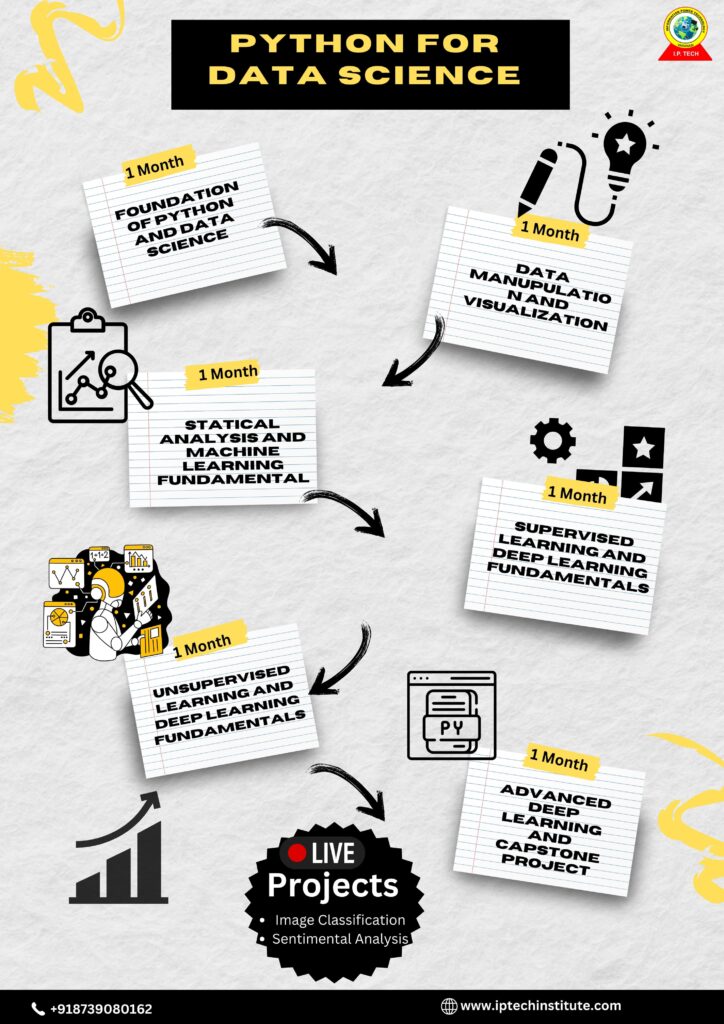Python
Mastering Advance Python 3 With Real World Projects
Python for Data Science (6 months)

Month 1: Foundations of Python and Data Science
Week 1: Introduction to Data Science and Python
● Overview of Data Science
● Introduction to Python programming language
● Importance and applications of Python in Data Science
Week 2: Introduction to Python for Data Science
● Python basics: variables, data types, operators, and control flow
● Functions and modules in Python
● Introduction to Python libraries: NumPy, Pandas, Matplotlib
Week 3: Setting Up Environment and Basic Data Manipulation
● Installing Python and necessary libraries (NumPy, Pandas, Matplotlib)
● Setting up Jupyter Notebooks
● Basic data manipulations with Pandas: reading, writing, and exploring
datasets
Week 4: Advanced Data Manipulation with Pandas
● Data cleaning and preprocessing with Pandas
● Indexing and selecting data with Pandas
● Handling missing data and outliers
Month 2: Data Manipulation and Visualization
Week 5: Advanced Data Manipulation with Pandas
● Grouping and aggregating data with Pandas
● Working with time series data
● Combining and merging datasets with Pandas
Week 6: Data Visualization with Matplotlib and Seaborn
● Introduction to Matplotlib for basic plotting techniques
● Customising plots and adding annotations
● Introduction to Seaborn for statistical data visualisation
Week 7: Advanced Data Visualization with Seaborn
● Statistical plotting with Seaborn
● Pair plots, joint plots, and heatmaps
● Visualising categorical data with Seaborn
Week 8: Capstone Project: Data Visualization
● Project: Exploratory data analysis and visualisation on a real-world
dataset
● Presentation and peer review of projects
Month 3: Statistical Analysis and Machine Learning Fundamentals
Week 9: Descriptive Statistics and Probability
● Measures of central tendency and dispersion
● Probability distributions and random variables
Week 10: Hypothesis Testing and Correlation Analysis
● Introduction to hypothesis testing
● Correlation analysis and significance testing
Week 11: Introduction to Machine Learning
● Overview of Machine Learning
● Types of Machine Learning: Supervised, Unsupervised, Reinforcement
Learning
Week 12: Supervised Learning: Regression Techniques
● Introduction to regression analysis
● Linear regression and polynomial regression
● Model evaluation metrics for regression
Month 4: Supervised Learning: Classification Techniques
Week 13: Logistic Regression and Decision Trees
● Introduction to classification algorithms
● Logistic regression for binary classification
● Decision trees and ensemble methods
Week 14: Support Vector Machines (SVM) and Model Evaluation
● Support Vector Machines (SVM) for classification
● Model evaluation techniques: Confusion matrix, ROC curve,
Precision-Recall curve
Week 15: Supervised Learning: Classification Continued
● Introduction to multi-class classification
● Handling imbalanced datasets
● Advanced classification techniques
Week 16: Capstone Project: Supervised Learning
● Project: Building and evaluating predictive models using supervised
learning techniques
● Presentation and peer review of projects
Month 5: Unsupervised Learning and Deep Learning Fundamentals
Week 17: Introduction to Unsupervised Learning
● Overview of unsupervised learning
● Clustering algorithms: K-means, Hierarchical clustering
Week 18: Dimensionality Reduction Techniques
● Principal Component Analysis (PCA)● t-Distributed Stochastic Neighbour Embedding (t-SNE)
● Autoencoders for dimensionality reduction
Week 19: Introduction to Deep Learning
● Basics of neural networks● Building and training neural networks with TensorFlow/Keras
Week 20: Convolutional Neural Networks (CNNs)
● Introduction to CNNs for image classification● Building and training CNNs with TensorFlow/Keras
Month 6: Advanced Deep Learning and Capstone Project
Week 21: Recurrent Neural Networks (RNNs) and Natural Language
Processing (NLP)● Introduction to RNNs and their applications
● Introduction to NLP with TensorFlow/Keras
Week 22: Advanced Deep Learning Techniques
● Transfer learning and fine-tuning pre-trained models● Hyperparameter tuning for deep learning models
Week 23: Capstone Project: Deep Learning
● Project: Applying deep learning techniques to solve a real-worldproblem
● Presentation and peer review of projects
Week 24: Course Conclusion and Final Assessment
● Review of key concepts covered throughout the course● Final assessment and feedbac